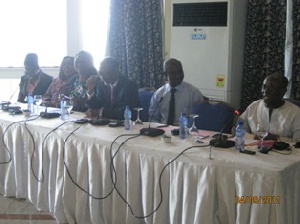Health News of Tuesday, 4 September 2012
Source: GNA
Workshop on Reproductive Health and Sexual Rights opens
Professor Fred T. Sai, a former Presidential Advisor on Population Issues, Reproductive Health, and HIV/AIDS has called on Governments in Sub-Saharan Africa to implement the Maputo Protocol on the Rights of Women, especially the section dealing with conditions under which abortion should be legally permitted.
He said in spite of vigorous advocacy efforts by stakeholders on reproductive health issues, the region still faced major challenges in making quality sexual and reproductive health services widely available and accessible.
Prof. Sai made the call at the opening of the 2012 Reproductive Health Advocacy Network Africa (RHANA) Regional Planning Meeting in Accra on Tuesday.
The three-day meeting was on the theme: “Forging Stakeholders’ Consensus and Ensuring Political Support for Sexual and Reproductive Health and Rights Beyond 2015”.
RHANA was established with the aim of bringing like-minded organizations and individuals together at the Africa regional level to advocate for universal access to sexual and reproductive health and rights.
Prof. Sai said reproductive health statistics including total fertility, maternal and child morbidity and mortality and contraceptive prevalence rates in Sub-Saharan Africa clearly showed that in spite of advocacy efforts by individuals and institutions, and some policy statements by governments and activities of international and local NGOs, the region still did not have access to those services.
“Today, less than one third of our people have access to Sexual and Reproductive Health Right Services (SRHR). Under current trends, it is unlikely that any of our countries will reach the agreed Millennium Development Goals 5 target of reduction of maternal health or the achievement of universal access to SRHR services by 2015,” he said.
Prof. Sai said that was clearly evident from the continent’s SRHR indicators, which were among the poorest in the world and stressed the need for the region to strengthen the policy and programme environments for the provision of reproductive health services, especially family planning; improved coverage and ensure commodity security, particularly in the rural communities.
He also called on the region to work to significantly reduce the high rates of unsafe abortions and the misconceptions associated with it; ensure effective management of sexually transmitted diseases; improve access of young people to sexual and reproductive health services, and generally improve conditions under which health services were provided.
He said in the lead up to the post 2015 development agenda and beyond, it was important for Civil Society Organizations (CSOs) to draw attention of governments to reflect on and evaluate their performances under previous and current international development conventions they had ratified.
That, he said, would uncover the gaps, lessons, the mistakes and the best practices in SRHR as it pertained within their own peculiar circumstances, which would significantly enrich the arguments for a strong focus on SRHR in Africa in the development of the post 2015 agenda.
He, therefore, urged all participating CSOs to continue to remind their governments to translate their commitment and policies into action by advocating at the community, national, regional and continental levels for an enabling environment to promote universal access to SRHR.
“You must also advocate increased resource allocation from donors and governments for reproductive health for the realization of MDGs, the Maputo Plan of Action at the national level and advocate for governments to review laws or policies that deny people, in particular young people, and most at risk populations’ access to reproductive health services.
“Maintain policy dialogues on reproductive health with government and key stakeholders and complement government’s interventions in service delivery especially targeted at disadvantaged communities,” he added.
Professor Sai said effective advocacy must be based on factual knowledge, passion and above all compassion and urged RHANA and its member organizations to speak with one voice on issues confronting the continent to make the desired impact.
“As you brainstorm the issues in this meeting, you may not agree on everything but agree to disagree. No matter what you do, make sure your voice is one,” he said.
Dr Gloria Quansah-Asare from Ghana Health Services said RHANA was a well thought and planned platform for SRHR and urged participants to consider everybody’s needs in their deliberations.











